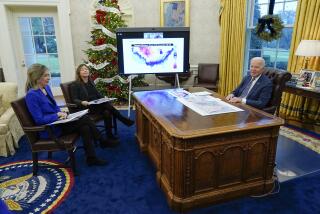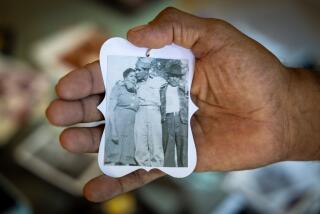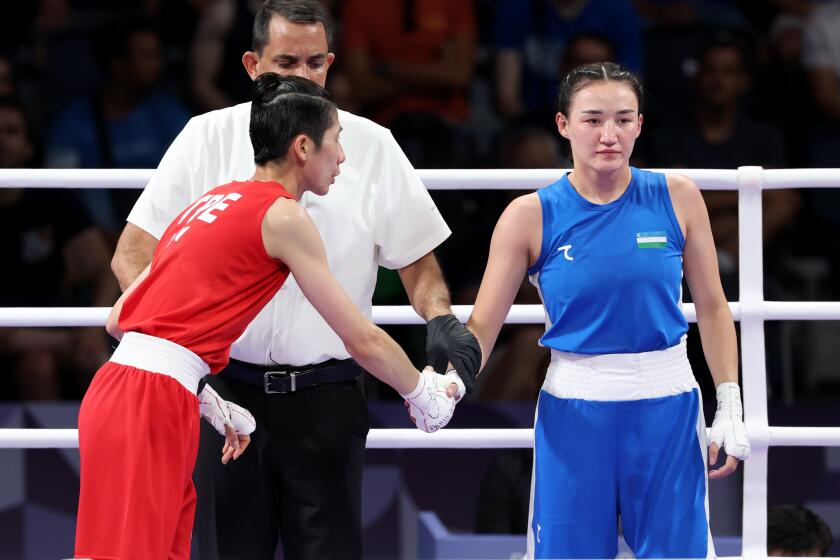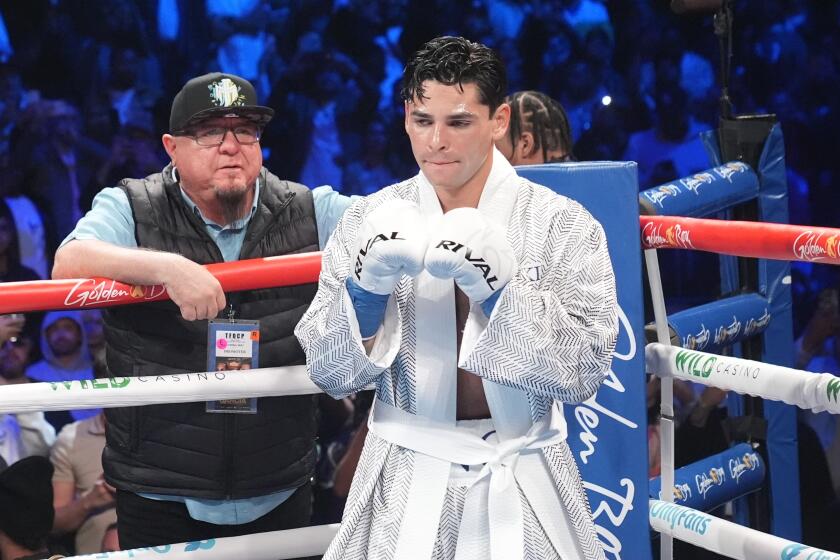There’ll Be No Requiem for a Featherweight
COVINA — Johnny Chavez weathered his first knockout at age 6. He was zooming around on his Big Wheel in front of his family’s Azusa home when he lost control of the tricycle and slammed, head first, into a parked car.
“I was thrown flat on my back,” the 25-year-old professional boxer recalled. “That was the first time I ever had the wind knocked out of me. My dad took me inside. I was crying. I kept asking him, ‘Am I going to die?’
“My brother Dean just stood there watching--laughing at me. ‘Are you going to die?’ he said. And he kept laughing.
“I was so angry at him.”
Chavez did not suffer another knockout until 16 years later.
After an amateur career that began at age 12, he stepped into the professional ring in 1989. He won that first match, but was KOd in his second. In all, he won 17 of his 19 featherweight bouts. One ended in a draw.
That promising record, however, came to a jolting halt Nov. 6 at the Great Western Forum in Inglewood.
Even though Chavez won that night in eight rounds, he suffered severe retinal tears in both eyes. Doctors have told the young fighter he can never return to the ring.
It will be another four months before doctors remove the silicone surgical implants that are helping Chavez’s eyes recover. Until then he must rely on disability insurance to help support his girlfriend and their 10-month-old son. They share a small Covina apartment.
By the sixth round of the Nov. 6 bout, Chavez said, his opponent had hit his right eye “a little hard a couple of times.” After that, his vision changed.
“When I got up off of my stool, something shifted and I think that’s when my eye started hemorrhaging,” Chavez said. But the fighter said his adrenaline was so pumped up that “I didn’t realize I was only looking out of one eye, so I finished the fight.”
During the ride home, he tested his eyes by covering his left one and trying to see out of the right. He saw nothing. That was when Chavez told his sister, Sylvia Martinez, who was driving, to take him to a hospital.
Dr. Robert Karns, a physician for the California Boxing Commission, was one of the first specialists to see Chavez. He said the young fighter’s case was unfortunate because he was born with weak retinas. Boxing, the doctor said, exacerbated the problem.
“Obviously, if he didn’t box, it wouldn’t have happened,” Karns said. “Johnny’s is a most rare and unusual problem.”
“People have been coming up to me saying they’re sorry to hear about my career ending,” Chavez said on a recent night as he cheered a friend on at a fight in Irvine. “To me, I don’t look at it as a tragedy. It’s just another step in life.”
And in retrospect, Chavez said, he would not have lived his first 25 years any differently. He said he has always had a passion for physical contact, something he acquired growing up as the youngest of seven children.
Today, the Big Wheel incident reminds Chavez of how much his older brother’s deriding, and their mutual roughhousing, helped pique his interest in pugilism.
Dean Chavez, 32, said the treatment he gave his little brother over the trike crash, and some of his other mishaps, “was just a way to toughen Johnny up.”
“In school,” the elder Chavez brother recalled, “it seemed like guys would come up to you all the time and try to start fights.”
Roughhousing, Dean said, was “the natural thing with brothers. He (Johnny) was pretty tough for a kid. I roughed him up partly because my brothers did it with me. I would tell him not to let people push him around. I was just trying to prepare him for the world.”
Johnny Chavez said his brother would wrap both their hands in socks and the older boy would get on his knees and the two would spar on the carpet in a bedroom.
“I just like the contact of getting rough, fighting and wrestling,” the younger Chavez said. “We’d go in Dean’s room, because sometimes he’d make me cry. When my parents heard me crying, they’d tell me, ‘You know you’re going to get hurt.’ That didn’t stop me. I would go right back in the room.”
That passion, he said, carried him through many a boxing match.
“It felt good winning,” Chavez said.
Though Chavez said his Azusa neighborhood was safe, the barrio was only a mile away. But even there, on those meaner streets, was the Azusa Youth Boxing Club, where Chavez trained.
“If you weren’t going to school and in sports, you were bound to get into trouble,” he said. “Sports, for a kid, are very important . . . I think that’s why Azusa comes out with a lot of tough little fighters. They come from the one of the toughest neighborhoods.”
While Johnny Chavez toiled up the boxing ladder, Martinez, 35, helped give a boost to her brother’s local hero status in Azusa, a small town at the base of the San Gabriel Canyon. In 1988, just before Chavez, then 22, turned pro, Martinez went to a T-shirt design shop and had “The Canyon City Kid” emblazoned on a shirt.
Martinez said that, at first, her brother wanted nothing to do with it, saying he wasn’t ready for a nickname. But after two pro fights--a win and that humiliating knockout--Johnny donned the shirt and entered the ring for his third match.
“When he wore it,” Martinez remembered, “I knew he was ready.”
He was--and he emerged from the ring with a victory.
Michelle Wilhelm, 24, Chavez’s girlfriend of seven years, said that since his injury, “the roles (at home) have reversed. I’m the one who’s working. He’s staying home with the baby.
“We used to have no time to go out,” Wilhelm, a bank teller, said. “Boxing was his life. He thrived on having all the attention.”
She said the changes in the household have had their good and bad sides.
“Now there will probably be more time for us,” Wilhelm said. “We were always put on the back burner. I like him being home, but I also feel bad, because he gets claustrophobic” having little to do.
Letting go of his ring glory has, indeed, been hard, Chavez said.
In boxing, he said, “There’s no one else around helping you win. You’re out there by yourself. I like that. I always tell everyone when I win, ‘I’m the Man of The Hour.’ I’m the only guy in there. . . . Nobody else gets the credit.”
After his third pro bout, he recalled, “I started to get a name around town. People would ask me, ‘What’s your record? When are you fighting again?’ That’s when I started to get on TV. It’s funny because people would stop me in the market to tell me, ‘Hey, man, that was a good fight . . .’ Both men and women. I would get tickled pink.”
For those who wonder what drives a person to push himself to the limit--early to bed, up before dawn, the endless roadwork and ring workouts--to prepare for a sport that often leads to, at the least, cuts and bloody noses, Chavez said nothing beats the “natural buzz” of boxing.
“You don’t even feel it when you’re in there,” he said. “You’re just numb. Your face goes numb after the first couple of hits. Then you’re so psyched up and intense that you don’t feel it. You’re scared. Sometimes it feels like you’re fighting for your life.
“It’s a crazy feeling.”
Later, holding John Jr. in his arms, he added:
“My heart feels like it might be 90% boxing. If I didn’t have my family with me, my little boy, I think it would be exceptionally hard. Now that I have all this, I’ll only miss it a little bit.
Chavez plans to enroll at a local community college after he recovers. He hopes to become a youth counselor or coach.
“I know something good is going to come of all this,” he said. “Whether it’s having more time to spend with my family, or going to school like I’ve always wanted, I’m looking at this as a positive thing.
“God had a reason for this.”
More to Read
Go beyond the scoreboard
Get the latest on L.A.'s teams in the daily Sports Report newsletter.
You may occasionally receive promotional content from the Los Angeles Times.










